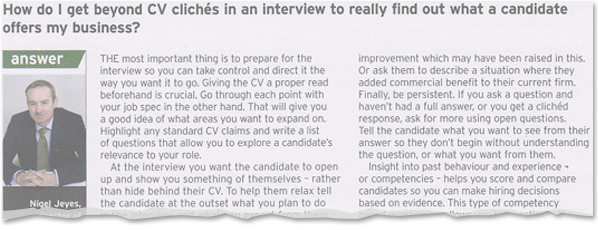
Business Edge - September 2010
Answered by Nigel Jeyes, director of Grafton Banks Finance
THE most important thing is to prepare for the interview so you can take control and direct it the way you want it to go. Giving the CV a proper read beforehand is crucial. Go through each point with your job spec in the other hand. That will give you a good idea of what areas you want to expand on. Highlight any standard CV claims and write a list of questions that allow you to explore a candidate's relevance to your role.
At the interview you want the candidate to open up and show you something of themselves - rather than hide behind their CV. To help them relax tell the candidate at the outset what you plan to do in the interview and what you expect from them. Open body language from you, and a smile, will break down nerves and encourage the candidate to open up.
Clichés breed clichés so be careful what you ask. Steer away from traditional 'strengths and weaknesses' questions. You can get this information and more besides by asking in a different way. Perhaps ask about their last appraisal, and any areas of improvement which may have been raised in this. Or ask them to describe a situation where they added commercial benefit to their current firm. Finally, be persistent. If you ask a question and haven't had a full answer, or you get a clichéd response, ask for more using open questions. Tell the candidate what you want to see from their answer so they don't begin without understanding the question, or what you want from them.
Insight into past behaviour and experience - or competences - helps you score and compare candidates so you can make hiring decisions based on evidence. This type of competency based questioning allows you to investigate the key skills crucial to your role and your company. For our factsheet on competency based interview techniques, go to www.graftonbanksfinance.co.uk
Senior consultant moves to Grafton
The Breakfast Seminar held on Friday 29th October...














